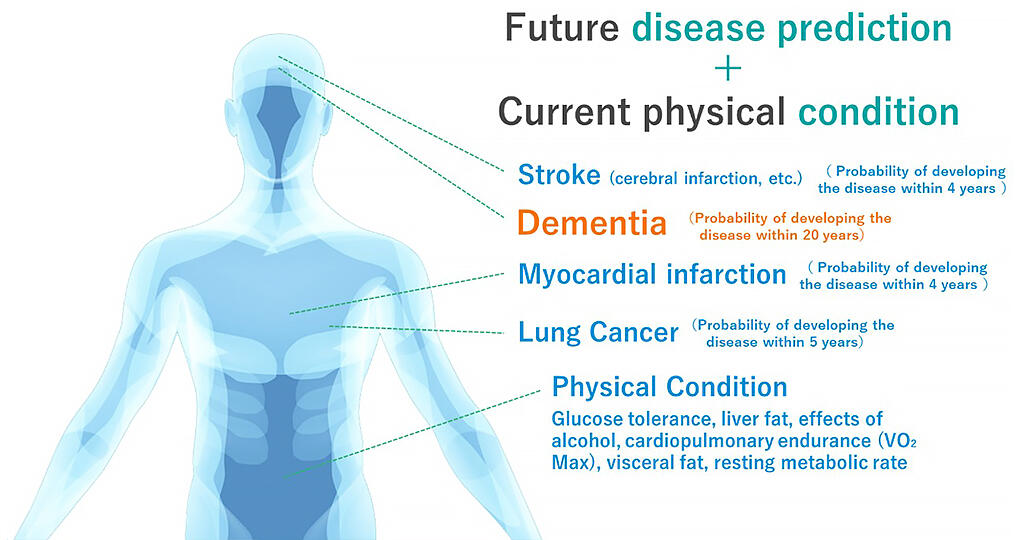FonesLife Corporation (Nihonbashi, Chuo-ku, Tokyo) provides testing services via medical institutions, using blood to predict the likelihood of future diseases *1. The company's digital health care service, FonesVisuas, has added a new test that predicts the risk of the onset of dementia within 20 years of the day of the test, and started rolling these out gradually in the medical institutions that offer its services earlier this year. Based on the concept of "even earlier than early detection," FonesLife of the NEC Group (wholly owned by NEC Solution Innovators) began providing FonesVisuas, Japan's first testing service for the prediction of future diseases, in 2020, using technology from SomaLogic Operating Co., Inc., which measures around 7,000 types of protein in one go from a small amount of blood. The service already visualizes the future risk of myocardial infarction, strokes and lung cancer, and provides total support, including improving lifestyle habits.
The newly added test for dementia was developed through research from Europe and America that followed a specific group of people over a long period of time, engaging in statistical analysis and the analysis of proteins in blood drawn and collected as part of the study. It determines the risk of the onset of dementia in 20 years or less based on four categories and presents the risk of onset (%) and the risk multiplication factors, which signifies how many times more likely the onset of dementia is when compared to the average during test development.

Provided by FonesLife
The new service has been subject to joint research with and evaluation by medical specialists from Nagoya University and the National Center for Geriatrics and Gerontology, upon which NEC Solution Innovators also worked, which confirmed the validity of its use for Japanese people. A study on future estimates of the elderly population with dementia in Japan *2 estimates that in 2025 the population aged 65 or older will have reached over 36 million, and 19% (one in five) of these will develop dementia. It also estimates that in 2040, around 35% of the total population - over 39 million people - will be 65 or older, and predicts that as the population ages, the number of people with dementia will increase *3. This new test for the risk of dementia determines the risk of the onset of dementia within 20 years by analyzing the patterns of 25 types of protein in the blood from around 7,000 types of protein using technology developed in Japan that measures around 7,000 types of protein in one go from a small amount of blood. The company is also promoting initiatives to increase the targets for FonesVisuas testing, aiming to include breast, bowel and pancreatic cancers, among others, and to realize predictions for the risk of over 50 diseases in the future.
The medical institutions that have gone ahead and started offering the test to predict the risk of dementia onset are: Atama to Karada no Healthcare Clinic Kanda (Total Body Health Care Clinic; Chiyoda-ku, Tokyo), Oriental Ueno Kenshin Center (Taito-ku, Tokyo), Oriental Clinic (Chikusa-ku, Nagoya City), Nagoya Station Clinic (Nakamura-ku, Nagoya City), Dojima Lifecare Clinic (Kita-ku, Osaka City) and Oriental Rodo Eisei Kyokai Osaka Shibu/Osaka Kenshin Center (Chuo-ku, Osaka City). From next January, the following clinics will also begin offering the test: Keiyukai Hospital No. 2 (Shiroishi-ku, Sapporo City), Kanazawa Kobu Memorial Hospital (Kobu, Kanazawa City, Ishikawa Prefecture), Takamatsu Konyamachi Clinic (Konyamachi, Takamatsu City, Kagawa Prefecture) and Aoki Yumi Medical Clinic (Hakata-ku, Fukuoka City, Fukuoka Prefecture). The company is recruiting medical institutions to offer its services as it starts providing these dementia onset risk tests.
*1: This is the first test in Japan that utilizes SomaLogic's technology to measure approximately 7,000 proteins at once. In order to clarify the relationship between blood proteins and diseases such as myocardial infarction and stroke, the test utilizes research data from Japan and overseas with the cooperation of experts in a wide range of fields. By comprehensively evaluating multiple proteins, the company is able to visualize "current" and "future" health status and risk of contracting diseases, which could not be determined by simply evaluating each protein individually and provide this information through physicians at medical institutions.
● FonesVisuas is the first and only test in Japan that utilizes SomaLogic's analysis technology.
● This test is available to individuals at participating medical institutions. The test results will be provided to the individual as medical treatment by a physician at the institution.
● The results of this test cannot be used for diagnosis, treatment, or prevention of disease without medical advice from a physician. Please consult with a physician at the medical institution where you receive the test results to help improve your health.
● The accuracy of the results of this test are not guaranteed, nor does it provide the same results as other testing methods.
● The disease prediction is intended to evaluate the risk of future disease onset and is not intended to determine current disease status.
● The results of future disease prediction are not intended to predict lifetime risk.
● There are no time or dietary restrictions for blood collection through this method.
*2: https://mhlw-grants.niph.go.jp/system/files/2014/141031/201405037A/201405037A0001.pdf
*3: http://www.ipss.go.jp/pp-zenkoku/j/zenkoku2017/pp_zenkoku2017.asp
This article has been translated by JST with permission from The Science News Ltd.(https://sci-news.co.jp/). Unauthorized reproduction of the article and photographs is prohibited.




